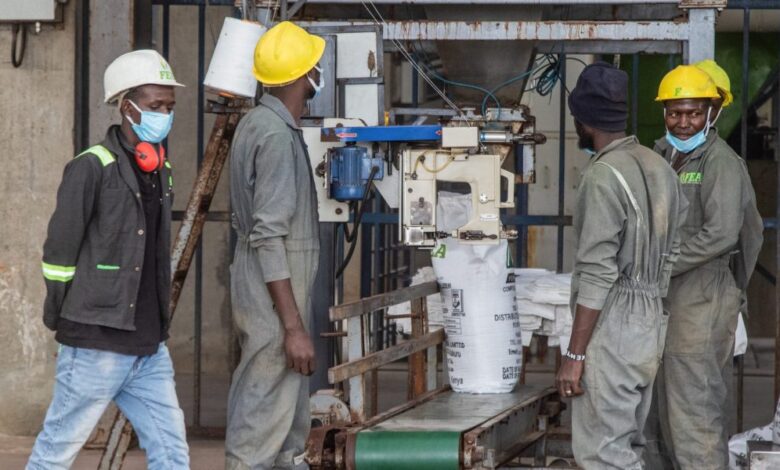Kenya’s fertilizer subsidy program began in 2008. Now farmers say soil is dying.


When Benson Wanjala started farming in his western Kenyan village two and a half decades ago, his 10-acre farm could yield a bumper crop of 200 sacks of corn. That number has dwindled to 30. He says his once fertile land has become a nearly lifeless field that no longer makes him a living.
Like many other farmers, he blamed acidifying fertilizer has been promoted in Kenya and other African countries in recent years. He said he started using fertilizer to increase yields, and it worked — until it didn’t. Government of Kenya first introduced fertilizer subsidies in 2008, making chemical fertilizers more accessible to small-scale farmers.
About 63% of Kenya’s arable land is now acidic, according to the Ministry of Agriculture, which has recorded declines in production of staples such as maize and major exports of vegetables, fruits and tea. Maize production is expected to fall 4% to 44 million tonnes by 2022, according to the Food and Agriculture Organization, but did not give a reason.
The Ministry of Agriculture has not responded to questions, particularly after a scandal over fake fertilizers in April. The fertilizers were found to be mined soil in misleadingly labelled bags distributed to farmers through a national subsidy programme. President William Ruto said about 7,000 farmers who bought the fake fertilizers would be compensated with the correct product.
Soil health problems are growing as the African continent struggles to feed itself. Africa has 65% of the world’s remaining uncultivated arable land but spends about $60 billion annually on food imports, according to the African Development Bank. That spending is expected to rise to $110 billion by 2025 due to increased demand and changing consumer habits.
In May, Kenya hosted a pan-Africa soil health summit to discuss declining productivity, climate change and other issues that are raising food security concerns. Agriculture is a major part of Kenya’s economy, accounting for more than a quarter of GDP.
At the summit, Stephen Muchiri, executive director of the East African Farmers Federation, advocated a return to traditional farming methods to restore dead soils, including growing a variety of crops and minimizing soil disturbance.
“Inorganic fertilizers were never meant to be the basis of crop production,” he said, adding that due to “commercial farming, our soils are now poor, acidic, low in biomass resources and devoid of life!”
Farmers should rotate crops on their land and collect compost from livestock such as goats, he said: “There has to be some kind of conversion and adaptation to get our soils back to a fertile state.”
Experts say soil acidity causes soil degradation by reducing the ability to provide essential nutrients to plants, making soil more susceptible to structural deterioration and erosion.
The programme coordinator of the Alliance for African Food Sovereignty, Bridget Mugambe, has advised on phasing out chemical fertilizers.
“Soil health is not just about quick fixes like chemical fertilizers. In fact, chemical fertilizers have seriously damaged our soils in Africa. We need to think about our soils in a more holistic way,” she said.
The Soil Health Summit hosted by the African Union – which in 2006 recommended that members use more chemical fertilizers – adopted a 10-year plan calling for increased investment in producing both organic and chemical fertilizers locally and tripling their use to boost yields.
During the summit, AU agriculture commissioner Josefa Leonel Correia Sacko asserted that the continent is “losing more than $4 billion in soil nutrient value every year.”
Kenya relies heavily on imported fertilizers due to low domestic production. The main suppliers are the European Union, followed by Saudi Arabia and Russia.
Kenya’s recent fertilizer scandal should not discourage farmers, said John Macharia, director of the African Alliance for a Green Revolution in Kenya.
“It’s imperative that we can work with the government to really make sure that we have the right type of fertilizer coming into our stores,” Macharia said. He recommends both chemical and organic fertilizers as long as they address the specific problem in the soil, and said soil analysis will guide farmers.
Deteriorating soil quality is a food security concern across Africa.
In Zimbabwe, once the region’s breadbasket, about 70 percent of the soil is acidic, according to the government. The government used chemical fertilizers in the past to boost soil fertility, but misuse has led to a decline in organic matter.
“Before mineral fertilizers were introduced, our ancestors had the knowledge and understanding that if you add organic fertilizer, the soil will be fertile and the crops will grow better,” said Wonder Ngezimana, associate professor of crop science at Zimbabwe’s Marondera University of Agricultural Science and Technology. “That was the traditional norm in Zimbabwe and other parts of Africa, where people were looking for any kind of organic matter to add to the soil.”
These include animal manure, grass, leaves and twigs, crop residues, ashes and compost. But many farmers in Zimbabwe no longer keep livestock because of the recent drought, Ngezimana said: “Farmers are struggling to maintain soil health because they can’t generate enough organic matter.”
AGRA recommends farmers to check soil acidity and apply lime to reduce high acidity.
But farmers say both are limited and expensive. Soil testing services are available through government agricultural agencies, public universities and private organizations for $20 to $40.
Farmer Wanjala said he couldn’t even find cattle to use as fertilizer and barely had enough seeds.
“I can’t afford any more expenses,” he said.




